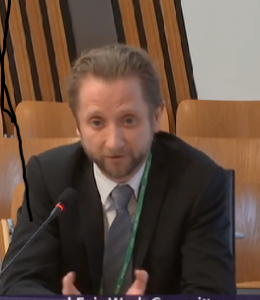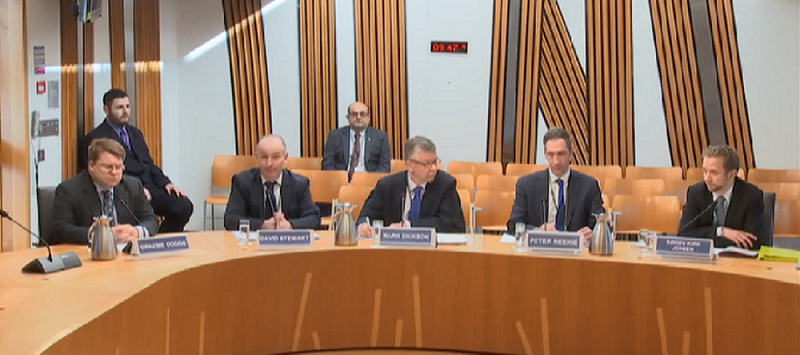Today CoST Senior Policy and Research Adviser Søren Kirk Jensen appeared before the Scottish Parliament’s Economy, Jobs & Fair Work Committee to discuss how greater transparency, accountability and disclosure could improve infrastructure investment in Scotland. Mr Kirk Jensen’s evidence supports the committee’s inquiry into construction and the Scottish economy, which seeks to understand the characteristics of Scotland’s construction sector and ensure it realises its full potential. Other witnesses in attendance included representatives from Scottish Futures Trust, Scottish Water, Scottish Federation of Housing Associations and Jacobs.
In presenting evidence to the Committee Søren used CoST’s 2018 case study on Infrastructure Governance in Scotland as a basis. The case study, released as part of our series on infrastructure transparency in high-income countries, found that Scotland has taken significant steps towards advancing infrastructure transparency, particularly through its institutionalisation in law and policy. However, we also found room for improvement and that by addressing areas relating to all four core features of CoST – disclosure, assurance, multi-stakeholder working and social accountability – it could significantly advance its infrastructure transparency profile.
Key messages to the committee
- In addition to attracting more private finance for investment in public infrastructure, strengthening infrastructure governance will address efficiency gaps and ensure better value from current levels of investment. Transparency, participation and accountability are core pillars of improved governance.
- The creation of the Infrastructure Commission for Scotland is a positive step towards developing an overarching infrastructure strategy which identifies the long-term needs and constraints for capital investment in Scotland. This should enable strategic assessment of the
 complex relationship between needs, affordability, political priorities and implementation capacity.
complex relationship between needs, affordability, political priorities and implementation capacity. - Scotland’s infrastructure transparency is performing well as measured against the CoST Infrastructure Data Standard disclosure requirements. However it remains fragmented and scattered, something which an online, open data platform could easily resolve.
- Multi-stakeholder working, one of CoST’s core features, consists of bringing together government, industry and civil society in an effort to improve transparency and accountability in public infrastructure. In countries such as Scotland, governing institutions could increase their legitimacy and credibility by adopting elements of multi-stakeholder working to become more representative of different sectors of society.
Speaking shortly after the event, Mr Kirk Jensen said:
“It’s very encouraging that the Scottish Parliament is considering ways to improve the management of investments in public infrastructure, including using our evidence on the levels of transparency and stakeholder engagement. Both the Scottish Government and Parliament are highly committed to openness and participation in public policy-making, and improving certain aspects of its infrastructure governance will put Scotland’s level of infrastructure transparency in pole position.”
Read our full case-study on infrastructure transparency in Scotland here
Find out more about the Economy, Jobs & Fair Work Committee’s inquiry here
